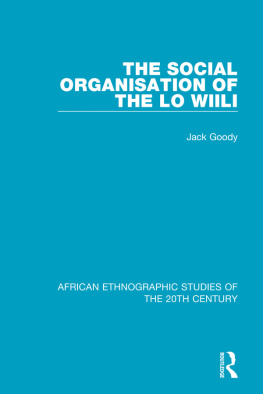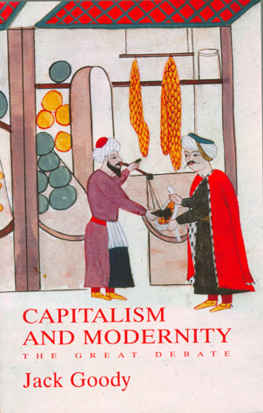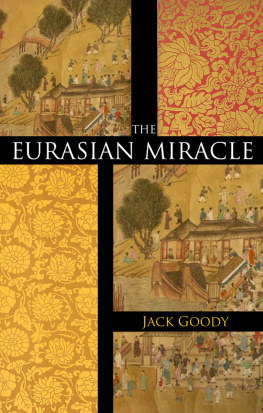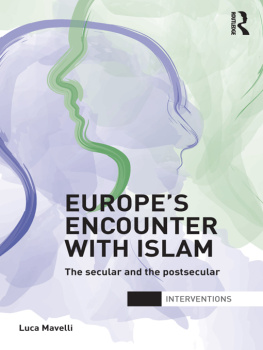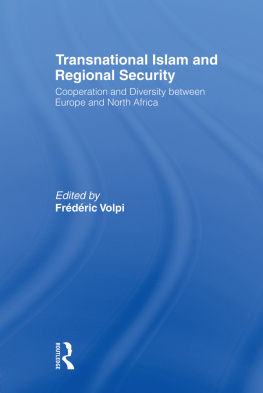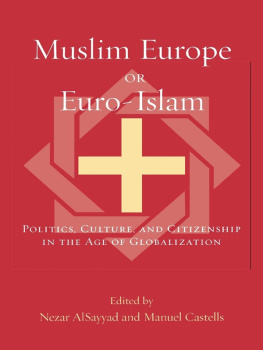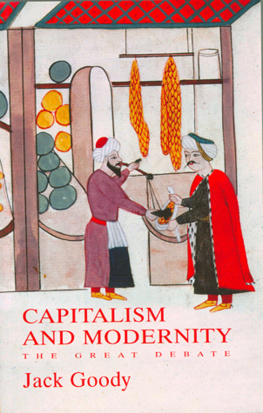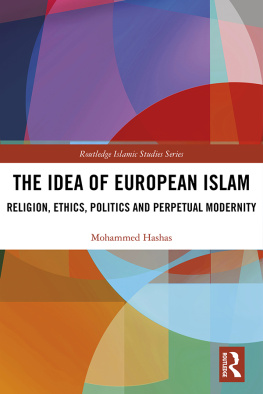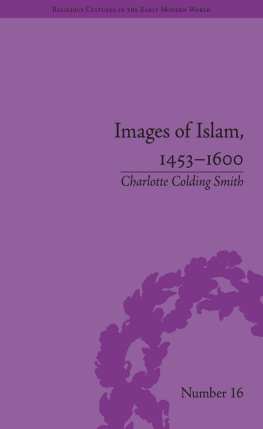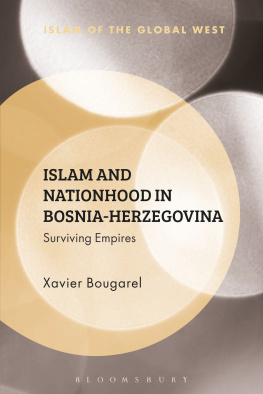Copyright Jack Goody 2004
The right of Jack Goody to be identified as Author of this
Work has been asserted in accordance with the UK Copyright,
Designs and Patents Act 1988.
First published in 2004 by Polity Press in association with
Blackwell Publishing Ltd.
Reprinted 2007, 2008
Polity Press
65 Bridge Street
Cambridge CB2 1UR, UK
Polity Press
350 Main Street
Malden, MA 02148, USA
All rights reserved. Except for the quotation of short passages for the purposes of criticism and review, no part of this publication may be reproduced, stored in a retrieval system, or transmitted, in any form or by any means, electronic, mechanical, photocopying, recording or otherwise, without the prior permission of the publisher.
A catalogue record for this book is available from the British Library.
Library of Congress Cataloging-in-Publication Data
Goody, Jack.
Islam in Europe / Jack Goody.
p. cm.
Includes bibliographical references and index.
ISBN: 978-0-7456-3193-6ISBN: 978-0-7456-3193-6 (pb)
1. Islam Europe. 2. Muslims Europe. 3. East and West.
4. Terrorism Religious aspects Islam. I. Title.
BP65.A1G66 2004
297.094-dc21 2003009840
Typeset in 11 on 13 pt Berling
by Graphicraft Limited, Hong Kong
Printed and bound in the United States by
Odyssey Press Inc. Gonic, New Hampshire
For further information on Polity, visit our website: www.polity.co.uk
To Robert Hinde,
Partha Dasgupta,
compagnons de route,
and to all those other Fellows
of St Johns who have
helped with my enquiries

List of Maps

Preface
This short book has a number of origins. The Near East has long had an interest for me, ever since I found myself as a young man in the midst of Arab-Israeli and Greek-Turkish conflicts in the 1940s, conflicts that were partly suppressed at that time in the context of the wider struggle with the Axis powers. Returning to Cyprus many years later, in the company of Paul Sant Cassia, I was, like all other visitors, struck by the greater divide that now existed between the Muslim Turks and the Christian Greeks, in which it seemed that religion played a much stronger part than most social scientists allowed. That also seemed to be the case in the Balkans and was obviously so in Israel/Palestine. As a result of writing about this situation, I was asked to give a talk on Islam in Europe to a Socialist History Group in London, no doubt because their own approach saw religious differences as much less important than class ones, just as others saw them as expressions of ethnicity or identity. That effort at explanation led to my trying to clarify, in a simple and all too brief essay, the contacts and influences that Islam had had with Europe. Finding that religion generally and Islam in particular had been down-played, I wanted to show something of the nature of the interactions between Islam and Europe, taking seriously the actors view of the situation. That desire was reinforced in the aftermath of 11 September 2001, when Islam was increasingly seen as the enemy Other. I aimed to show that it was also part and parcel of the European past and present. And to do so from a generalists standpoint, for a non-specialist audience.
A version of the second chapter appeared in the New Left Review, vol. 7 (2001), and as revised in History and Anthropology, vol. 13 (2002), 112. A version of chapter 3 appeared in the latter journal, vol. 13 (2002), 139-43. I would like to thank John Kerrigan, Richard Beadle, Jocelyne Dakhlia, Murray Last, Richard Hodges, Nicole Rousmanire, Javier Ribas, Ulinka Rublack, Gilbert Lewis, Roxanna Waterson, Dionigi Albera, Peter Linehan, Caroline Humphrey and Ziba Mir-Hosseini, who provided references or who read chapters. I am grateful to Nile Green, Jessica Bloom, Melanie Hales and Susan Mansfield for their help in preparing the text.

Introduction
A spectre is haunting Europe. This is not the spectre of communism to which Marx and Engels were referring but rather the spectre of Islam and Islamic terrorism. With Marx and Engels we can say that All the Powers of Old Europe have entered into a holy alliance to exorcise this spectre: Pope and Czar, Metternich and Guizot, French Radicals and German police spies. We can easily translate the latter into their modern equivalents and add the USA, Russia, China, India and elsewhere. But is the comprehension of the spectre any greater? I wrote what I present here as a contribution to an understanding of the place of Islam in Europes past and present around the time of the attack on the Twin Towers in New York. Islam and Muslims had generally had a bad press in the West well before that time, but that tragedy has dramatically worsened the situation. The American president, George Bush, is notorious for having used the word crusade in relation to the war against terrorism, thus defining it as a war of the Cross against the Crescent, of Christianity, or in his case of Judaeo-Christian civilization, against Islam. As such it becomes a holy war (jihad), at least metaphorically, reverting to medieval and early modern perceptions. of a war pursued if necessary outside the rules of war and of the United Nations (by pre-emptive strikes), since the existence of terrorism is a threat to America. In the USA early in 2002 one was constantly being handed flags to display, often on ones car, or else badges of the Stars and Stripes to wear in ones lapel. On the rear window of many private cars appeared banners with the words God Bless America. As in the early days of the colony, God was seen to be firmly on the side of the Americans, helping them to defeat the Indians so the latter would become civilized and Christian. The notion of Christianizing the heathen has been given up as a political strategy, no doubt in view of the fact that Islam shows no sign of retreating quite the contrary. Nevertheless Bush is constantly calling upon God to back the United States in pursuit of her foreign policy. Religion is constantly brought into the picture.
There is an idea abroad that, of the worlds major religions, only Islam persists in the idea of a holy war. It is true that, with the increasing secularization that followed the Renaissance, much of Europe has been more tolerant about religion. Nevertheless the wars and struggles between Catholics and Protestants were frighteningly savage. Following the Enlightenment the situation changed. But much of the ideology behind the extensive colonial expansion of that continent was Christian in tone and was accompanied by hordes of missionaries penetrating into every corner of the world. With the backing of the colonial powers and their armies, they had no need to use force themselves. The conquest had already been done for them. In Islam, on the other hand, leadership of the state and the religion are ideally combined in one person, so all wars are religious wars.
The USA suffered a severe blow on 11 September 2001, a blow that literally came out of the blue, unexpected, unpredicted, unprecedented, in a country that sees itself as far removed from the front line. But the use of the term terrorist seemed to suggest an enemy whose only purpose was the use of violence for undiscernible ends. That usage distracted attention from the question of whether there was any political, social or religious aim behind the acts, and whether the perpetrators saw themselves as having alternative means of pursuing them. It distracted attention from the way that a good part of the rest of the world contemplates the situation of a single superpower which possesses an immense preponderance of military and economic might, so that one way or another it can command, assert or impose its will on other parts of the world. Such preponderance of unequal resources inevitably encourages resistance and opposition. The positioning of troops in the Near East, especially in Arabia, the support given to its satellite Israel, the scramble for oil, these are particular foci of resentment. And while in most cases that resentment does not issue in active forms, it can always do so, leading to a violence which employs similar notions of holy war to that implicit, and often explicit, in the actions of the West, though there the sacred aims are phrased in terms of liberty, democracy, the free market, rarely in terms of equality or fraternity. If this analysis is remotely correct, it means that, while the war on terrorism may undoubtedly gain its local victories, the resistance itself will emerge again and again. A defeat in Afghanistan is followed by a devastating blast in Bali, a mass kidnapping in Moscow, perhaps even a sniper in Washington. Hydra-headed, it will emerge in one form or another while the problem exists, the problem that rarely receives an adequately comprehensive analysis and that demands a socio-political solution, rather than armed conflict or the raising of cries of terrorism among all the non-Islamic powers, Europe, Russia, India and China, as well as the United States. All states wish to control resentful minorities.
Next page

